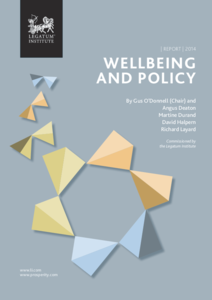
“This report looks at how the world should measure success in the post-GDP only era.” So states Lord Gus O'Donnell, previously Head of the UK Civil Service and Cabinet Secretary from 2005 to 2011, and co-author of a report by five leading thinkers and academics on the use of well-being for the design and evaluation of policy. The document's significance does not just lie in its influential authorship and its detailed record of that period in the UK's political history when there was a turn towards well-being. Equally important is its attempt to legitimate subjective well-being as a principal objective for public policy alongside traditional goals like higher GDP, and to bring well-being metrics such as life satisfaction (how satisfied are you with your life these days?), affect (how happy/worried/depressed do you feel?) and eudaimonia (how worthwhile do you feel the things you do in life are?) out of the margins of policy evaluation and into the mainstream. Given this, it is worthwhile reflecting on why a report of this stature that considers every aspect of our lives from health, work, education and the environment to social contact, friendship, family life and our confidence in public institutions does not mention the arts and culture.
However, after a little reflection the absence of arts and culture from the report is perhaps not so surprising after all. While arts and culture studies are beginning to mine data sources such as those above, the studies remain tentative about what they say about the causal, as opposed to correlative, relationship between arts and cultural engagement and well-being (as, for instance, in the case of Fujiwara, 2013). Wellbeing and policy is able to point to growing number of experiments and randomised controlled trials in the various domains it covers. The same cannot be said for the arts and culture (Fujiwara et al., 2014). As comparative methodology studies in the arts and cultural sector remain few and far between, there is also too little understanding of the pros and cons of subjective well-being over more traditional evaluation techniques as applied in the cultural sector specifically – something that my own research collaboration with Daniel Fujiwara, Susana Mourata and Paul Dolan, supported by the Arts and Humanities Research Council's Cultural Value Project and the DCMS, is hoping to address. More generally, well-being research in the arts and cultural area needs to step up to meet the standards of research being conducted in other areas that the authors of Wellbeing and policy are able to point to.
Source: Article text
